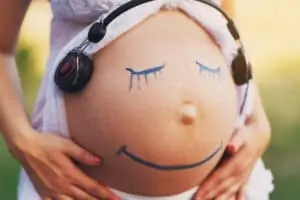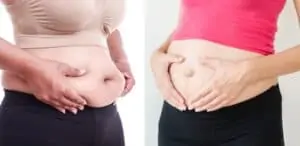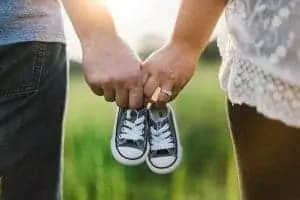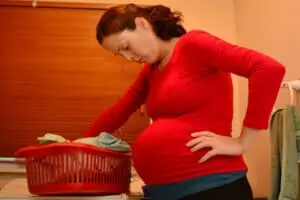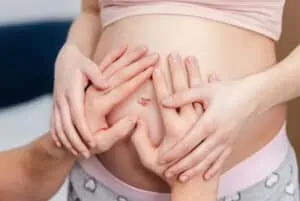I had my first daughter at 34. My second was born just 3 weeks after I turned 38. I have the advantage of rolling my eyes at the 20-something moms of my daughters’ classmates, but I was also fortunate to have healthy children. As the clock ticks past 35, experts say your chances of having a healthy pregnancy and resulting healthy children start to reduce.
For me, I wasn’t even remotely ready to consider having kids in my 20s. I wasn’t even ready when I turned 30. I didn’t even like kids! I couldn’t understand women that gave up their youth to run themselves ragged raising kids in their 20s while I was out enjoying my life and building my career. But to each her own.
Now those moms that did it early have kids in college and their free time back while I’m the one running myself ragged in my early 40s.
Do You Want To Have A Baby After 35?
If you want to start a family once you’ve moved past your 35th birthday, there’s still time. More and more women have been waiting until they get older to become more financially secure, have a successful career, or just because they want to wait, and that’s all okay. I did it, and you can too.
But you should be aware of the risks that come with it. For me, my first one was a bit of a surprise. Surprise or not though, you should work with your OB/GYN to make sure things are going well. If you’re planning it, you have the distinct advantage of getting a pre-checkup to ensure your body is ready. If you didn’t plan, your first checkup will be very telling and will help you carry on properly.
Understanding The Risks Of Having A Baby When You’re Older
I want to stop here for just a second and remind you that your body doesn’t suddenly turn 35 and while mid-tequila shots with your girlfriends on your birthday, stop being fertile. It’s merely the time to reflect on choosing to become a mom or not.
Some of my friends have not become moms by choice. They’d prefer to have cats or dogs (I have one friend who even has chinchillas!). Others had issues that prevented them from being fertile, even before 35. One of my friends is a breast cancer survivor. While she’s been cancer-free for years now, it left her unable to have children of her own. But her story has a happy ending which I’ll get to further on in this article.
If you’re going to go for having your own kids and you’re 35 or older, it’s important to be informed. So here’s what you need to know:
- You might have to try a lot harder to get pregnant
You were born with a certain number of eggs and that number decreases in both quantity and quality as you move into your mid-30s and beyond. Another potential difficulty is that the older you get, the harder your eggs are to fertilize. If you’ve been trying for 6 months and nothing has come of it, you should consult your doctor for options.
- Multiples are much more likely
For some women, having twins or triplets is like hitting the jackpot. For others, it’s going to send you into a shock. Your chances of having twins multiplies, pardon the pun, because of hormonal changes which may cause your body to release more than one egg at a time.
While more than one can be a blessing, your pregnancy is often more difficult and more high-risk with multiples. Plus, not always do all the babies make it. A friend of mine from abroad recently found out she was pregnant with triplets. On her next checkup though, she sadly found that two of them did not make it and she was left with just one healthy baby inside of her.
- Chances for gestational diabetes go up
This diabetes happens during pregnancy and is much more likely for older women. You’ll have to eat carefully, watching your sugar intake even more than ever. You shouldn’t ignore it either. Gestational diabetes can cause your baby to grow larger than they should which can lead to injuries when it’s time to deliver. With gestational diabetes, you also have a greater chance of delivering preterm, higher blood pressure, and complications for your child after birth.
- Higher blood pressure is more likely
The risks for high blood pressure during pregnancy grow even more for older women. Your doctor will help keep a close eye on it as well as the development of your baby. You may even need to have more check-ups to keep things under control.
- There are more dangers for your baby
Your baby is much more likely to have a low birth weight or be born early. Or both! Preemies have many difficulties and watching them in the NICU is heartbreaking. You must mentally prepare yourself for this possibility. It happened to a good friend of mine and while her daughter is fine and thriving now 6 years later, it was a very stressful time for her.
Because of these risks, you’re more likely to need a c-section too. I had an emergency c-section because my eldest decided to turn around inside of me while I was trying to deliver her. You have to be ready that the way you want the birth to go may not happen and you’ll have to go with what’s best for your safety as well as that of the baby’s.
- Abnormality risks are higher
The older you get, the larger the risk you’ll have for birthing a baby with a chromosome problem. Down syndrome is one of the most common chromosome abnormalities. You have to think about whether you can handle this risk.
- You stand a greater chance for loss as you age
The older you get, the risk of losing your pregnancy, either by miscarriage or stillbirth, rises. Further research is needed, but they believe older men can contribute to health risks with their sperm too.
Rising Risks For Pregnancy By Age
Doctors say the best age for pregnancy is somewhere between 20 and 24, but that’s only medically-speaking. You are still good in most cases to have a baby after that age bracket, but the risks for complications start to rise in that time.
Here’s a breakdown by the decades:
30s
The 30s are a great decade for having a baby, particularly the early 30s. Your fertility starts to drop off once you hit 35 and move beyond that. It simply means it may take you longer to get pregnant, and you have more chance of having non-identical twins.
40s
Many women are having babies in their 40s, but there are challenges. Among them, it’s harder to have a baby at this age and you may need IVF and/or donor eggs. You have a higher risk of complications like pre-eclampsia, diabetes, and miscarriage, and your risk for birthing a child with Down syndrome is up to 1 in 100. It’s less likely you’ll conceive naturally during this time but still possible. If you use donor eggs from a younger person, you’ll have a better chance of everything working out.
50s and up
It is extremely rare for a woman over 50 to have a baby naturally. If you want one, you will need IVF and egg donation. Some doctors will refuse to deal with the risk too, making having a baby at this age very hard. Additionally, if you do wind up pregnant, you will have a harder time physically. Your body just can’t perform as it used to, leading to greater potential for heart problems, blood clots, or stroke. You’ll also have a harder time raising your child as an older woman.
What You Can Do To Have A Healthy Pregnancy As You Age
There is nothing you can do to guarantee a healthy pregnancy at any age, but the odds stack up against you the older you get. No matter how young or old you are, there are certain things you can do to better your chances of having a healthy pregnancy and birthing a healthy baby.
Make healthy choices
This is especially true for food. Eating nutritiously always does a body good, however, it can’t change your egg supply. You’re born with a certain amount of eggs and those eggs decline in quality and quantity as you age. But you should still eat right because if you have high blood pressure, diabetes, or you’re obese, it can make it more difficult for you to get pregnant or even sustain that pregnancy.
Once you are pregnant, be sure to get the right nutrients to nurture your baby. Folic acid, iron, calcium, and vitamin D are some of the most important ones. Your doctor will likely insist you take a prenatal vitamin.
Check in with your doctor
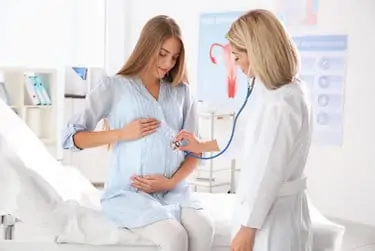
If you’re thinking about trying for a baby, you should get an overall health assessment from your doctor. This will help you make any changes you need for improving your odds of pregnancy and also give you options if you are having trouble getting pregnant.
Always stay regular with prenatal appointments
Once you get pregnant over 35, you should make sure you keep those regular appointments with your doctor. If something seems concerning to you, discuss it.
Watch your weight gain
Try not to gain too much weight, yet avoid gaining too little. Go with what your doctor recommends for your body.
Keep active
If you were active before getting pregnant, that’s fantastic! If not, start doing something now, even if it’s just walking daily. It will get your body ready for labor. You can ask your doctor for what he or she recommends you do. Regular exercise will prepare you for labor by increasing your muscle strength and overall stamina.
Get screened for abnormalities
Ask your doctor about prenatal testing that detects chromosomal abnormalities. Be aware though that certain diagnostic tests carry with them a slight risk of causing miscarriage. This is something you should discuss with your doctor fully to know the potential risks you face as well as the benefits.
Other Ways To Be A Mom
Unfortunately, it will be too late for some to conceive and birth a healthy baby. But that doesn’t mean you’re all out of options for becoming a mom.
Briefly, I mentioned a friend of mine who had survived breast cancer. It was a success that she was cancer-free and has remained so, however, she and her husband were very saddened to learn they couldn’t become parents themselves. Instead, they adopted a beautiful little girl. They all couldn’t be happier.
Adoption is just one option you also have should you not be able to conceive. You may also find fostering older children to be more your thing. Many children need loving homes out there.
Other options include finding a surrogate or trying IVF treatments. If you’re too old to conceive, though, it’s best not to cause harm to yourself and try finding an alternative method for having a baby. With surrogates and adoptions being robust options to explore, you may find that you can become a mom.
Remember, being a mom isn’t everything. If you’re fending to become a mom, think hard about it. Some of my friends are happy they didn’t become moms. Others of my friends found alternate ways to become moms. But as that clock ticks, get your ideas and affairs in order and make the right choice.
Leslie Berry lives with her husband and two young daughters in Los Altos, California, where she loves helping other moms get comfortable with motherhood and embracing the insanity with facts peppered with laughs.
She loves eating too much sushi, exercising, and jamming out on her Fender. Read more about Leslie here.

